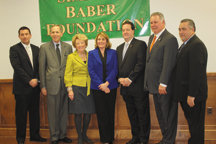For Margerite Baber, the downturn in the economy spelled real trouble for the Busy Bee Program, which is designed to help autistic children from 18 months to three years old.
Even with fundraising efforts, the program just couldn’t keep up with the costs.
While Bayonne Medical Center has been very generous to the program since its inception in 1996, the offer of a $150,000 three-year challenge grant last September surprised even Baber.
“We were going to give the money to them anyway,” said Dan Kane, chief executive officer for the BMC. “But we decided to make it a challenge grant.”
“We decided to make it a challenge grant.” – Dan Kane
________
To this end, the foundation has created a speaker’s bureau and self help program, organized parties and sports teams, purchased and donated educational technology, funded field trips, sponsored research, and built a self contained playground.
Co-sponsored by the foundation, the Bayonne Medical Center, the Bayonne Board of Education, and the City of Bayonne, Busy Bee is designed to give autistic children a head start at socializing, and their parents a needed break from the nerve-racking effort of caring for these children.
This is New Jersey’s first public/private collaborative program of its kind and is privately funded, designed to provide educational instruction using state certified teachers as well as neurological and education psychologists and consulting pediatricians. Children from ages 18 to 36 months receive up to 20 hours a week of direct, one-on-one education utilizing applied behavioral analysis.
This is designed to meet the needs of preschoolers who have recently been diagnosed with autism, and is offered free of charge to parents.
A personal issue
In the mid-1990s, Baber discovered that her son – then three years old – suffered from autism. This sent her on a frantic search for a school that would cater to his particular needs.
While Bayonne, she said, was “light years” ahead of most other places because the local school district already had programs for children three years and older, Baber believed more could be done.
Baber’s experience with her son made her realize that more resources were needed to help parents and their autistic children.
While the school district supplied everything necessary to provide an autistic child with the basic education through an individual education plan, other things could be provided through private donations.
She also realized that there were many misconceptions about autism. So in 1996, she helped found the Simpson-Baber Foundation to provide educational opportunities for kids and educate the general public.
“Autistic kids don’t often get invited to birthday parties,” she said, using this as an example of the small things that the foundation does. The foundation also organizes self-help groups and sports teams, offers lectures, and provides tools such as the playground for autistic kids at Woodrow Wilson School.
A special key in each kid
The school offers rewards for proper responses.
Baber said she did not initially believe that you could treat a biological problem with a behavioral technique, but has since been convinced by the results.
“But it works,” she said.
Each autistic child, she said, carries around a special key, an area of intense interest that – if cultivated – will allow the child to eventually come out of his or her personal shell. Her son Stephen, for instance, has a fascination with the prehistoric, and though he still struggles to work out other areas of his development, he has conversed easily and knowledgeably with PhDs at the Museum of Natural History. Other autistic students have achieved much in the Bayonne school district, such as winning spelling and geography bees.
Although structured like a traditional pre-school or kindergarten, she said the program focuses on what is fun. Whatever sparks the interest of a child, that’s what the school does. Teacher and aides ask a child’s name, trying always to make eye contact. Each time a child successfully meets the adult’s expectations, he or she is rewarded.
“Whatever makes the child tick, we try to encourage,” she said. “If they like to dance, we dance with them.”
The earlier they reach a child, the better the child responds, allowing many students to step into school based programs much more advanced than they would have been otherwise.
The foundation needs to raise money
Under the terms of the grant, the BMC will donate $50,000 per year for three years, contingent upon the foundation raising an equal amount from other donors.
“The foundation is confident that our supporters in the community will rise to the challenge,” said Kenneth Kopacz, president of the foundation.
The foundation raises money in a variety of ways, such golf outings and award dinners. In the past, the foundation has also put on Walks for Awareness, the annual Sail for Autism, and other events.
For more information about donations or the foundation’s various programs, call (201) 858-9933.
Al Sullivan may be reached at asullivan@hudsonreporter.com.
